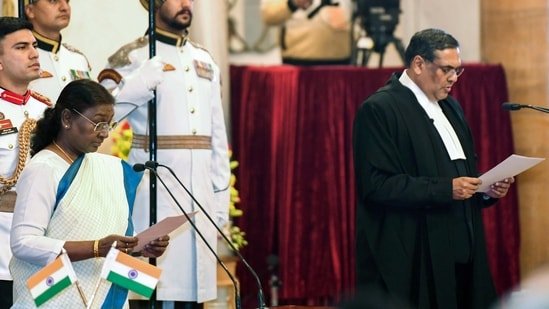Justice Sanjiv Khanna was sworn in as the 51st Chief Justice of India (CJI) on November 11, succeeding retired CJI DY Chandrachud. Known for his principled and often balanced judgments, Justice Khanna has become a prominent figure in India’s judiciary, following a legacy that began with his uncle, former Supreme Court Judge Hans Raj Khanna. Hans Raj Khanna famously challenged then-Prime Minister Indira Gandhi’s administration during the Emergency of 1975-77 by ruling that the right to life and personal liberty could not be suspended, even in times of crisis. This dissent cost him his chance to become CJI, as Indira Gandhi overlooked him, a move that led him to resign. His stance left a lasting mark on Indian judicial history, and his nephew Justice Sanjiv Khanna, inspired by these values, has now risen to the nation’s highest judicial post.
Rise to the Supreme Court and Key Judgments
Justice Sanjiv Khanna began his legal career after enrolling at the Bar Council of Delhi in 1983 and was appointed as an Additional Judge at the Delhi High Court in 2005. His dedication and judicial acumen led to his elevation to the Supreme Court in January 2019, and he is now set to serve as CJI for a six-month tenure until May 13, 2025.
In his Supreme Court career, Justice Khanna has presided over several significant cases. Notably, he was part of a seven-judge bench that overruled the 1967 Azeez Basha case, which had denied Aligarh Muslim University (AMU) minority status. He and his colleagues held that AMU’s status should be re-evaluated based on constitutional principles. A ruling that many saw as an advancement of minority rights in India.
Justice Khanna was also instrumental in the decision to uphold the abrogation of Article 370, which removed Jammu and Kashmir’s special status in 2019. In his concurring opinion, Justice Khanna argued that the abrogation did not infringe on India’s federal structure, marking a historic decision for the future of Jammu and Kashmir within the Indian Union.
Also Read: iPhone 17 vs. iPhone 16: Major Upgrades Expected in Display, Camera, and Performance
Electoral Bonds and Election Integrity
In the realm of electoral integrity, Justice Khanna’s rulings have shown a dedication to transparency. In 2019, he was part of a bench that increased the number of polling booths subject to physical Voter-Verified Paper Audit Trail (VVPAT) verification, ensuring greater accountability in elections. He again addressed election-related issues when he, alongside Justice Dipankar Dutta, dismissed a petition demanding 100% VVPAT verification for Electronic Voting Machines (EVMs). Khanna asserted that while transparency is essential, the current provisions provided adequate checks and balances.
In a high-profile 2024 judgment, Justice Khanna ruled against the government’s electoral bond scheme, deeming it unconstitutional. He argued that electoral donations, though private, must not compromise the transparency needed to safeguard democracy.
Other Notable Judgments
Justice Khanna has ruled on cases across varied domains. In 2018, he was part of a bench that decriminalized adultery in the landmark case Joseph Shine v. Union of India. He stated that criminalizing adultery infringed on personal freedoms and that the law was outdated. An opinion that was lauded by advocates of progressive jurisprudence.
Justice Khanna was also part of a bench that upheld the Supreme Court’s power to grant divorces under Article 142 without couples having to approach lower courts. This decision, in Shilpa Sailesh v. Varun Sreenivasan, streamlined the process for couples seeking separation, demonstrating his practical approach to judicial decision-making.
Further, Justice Khanna supported the Election Commission of India’s decision to halt the release of a biopic on Prime Minister Narendra Modi during the Model Code of Conduct period, prioritizing the importance of fairness in elections.
Justice Khanna also played a role in maintaining the compensation framework for victims of the 1984 Bhopal Gas Tragedy, refusing the government’s plea to increase compensation and upholding an earlier settlement as valid under the grounds set forth at the time.
Key Pending Cases
Justice Khanna is currently presiding over some critical cases, with judgments awaited in the coming months. He is part of a bench that will decide on the constitutionality of the 2019 Triple Talaq law, which made instant triple talaq a criminal offense. This case will have far-reaching implications on family law in India and is being closely watched by social and legal analysts alike.
The 2023 caste-based census conducted by the Bihar state government also falls under Justice Khanna’s scrutiny. His ruling on the case will shape India’s approach to affirmative action and resource distribution, touching on sensitive issues of caste and representation.
Additionally, Justice Khanna is leading a bench to examine the Chief Election Commissioner and Other Election Commissioners Act. This case involves an amendment made by the current administration that altered the structure of the three-member panel responsible for selecting the Chief Election Commissioner (CEC), replacing the CJI with a member chosen by the government. This ruling could determine the future of impartiality and independence in India’s election administration.
In another case, he is hearing arguments regarding the enforceability of Fundamental Duties as set out by the Indian Constitution. Which were introduced during the Emergency period by Indira Gandhi’s government. If the bench decides in favor of enforceability. This would mark a shift in how Fundamental Duties are viewed and could impact individual and civic responsibilities across India.
Anticipated Judgments on Minority Rights and Freedom of Expression
Justice Khanna will also be ruling on provisions within the National Commission for Minority Educational Institutions Act (2004) and the National Commission for Minorities Act (1992). These cases involve determining minority status criteria, specifically whether it should be based on state-level or national demographics. His ruling could have a significant impact on the way minority rights are legislated and enforced in India.
He is also expected to rule on the 2023 BBC documentary controversy. Where the government sought to ban a film critical of Prime Minister Modi. Justice Khanna’s judgment will be a crucial benchmark for freedom of expression, and the ruling could clarify India’s stance on censorship and media freedom.
Also Read: Australia Today reacts after Toronto’s ban for broadcasting Jaishankar’s press meet
A Pragmatic and Balanced Jurist
Justice Sanjiv Khanna has received both praise and criticism from various quarters. He was lauded by liberal advocates for rulings such as the decriminalization of adultery and the electoral bonds judgment, while his upholding of Article 370’s abrogation aligned him with the government’s stance on Kashmir.
In his brief tenure, Justice Khanna is expected to preside over rulings that address some of India’s most critical constitutional questions. From electoral reform to social equity. His impartial approach and focus on constitutional propriety suggest that his judgments will continue to emphasize the rule of law over political inclinations.
Justice Khanna’s legacy, following in the footsteps of his uncle, will likely reflect a nuanced balance between personal liberties and national interests. His approach to key rulings on issues such as minority rights, electoral integrity, and individual freedoms will shape the direction of the Supreme Court for years to come. Whether his tenure leads to further admiration or criticism, Justice Sanjiv Khanna’s impact on the Indian judiciary is sure to be significant.





